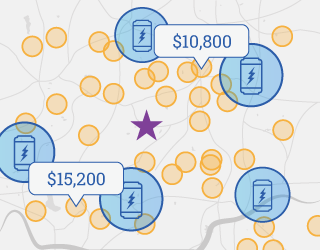The state of Maryland has taken its place alongside California and Massachusetts as a leader in energy storage, thanks to a new piece of legislation that establishes a state tax credit for batteries.
The Maryland solar battery rebate program offers a financial incentive worth thousands of dollars to homeowners and businesses looking to purchase batteries that can store energy on-site. With this tax incentive, the Old Line State becomes the first in the country to offer a direct financial boost to energy storage installations.
How does Maryland’s solar battery program work?
The solar battery tax credit in Maryland is structured similarly to other tax credits for solar. It offers a credit against state taxes worth 30 percent of the installed cost of an energy storage system.
The value of the credit is capped at $5,000 for a residential project and $75,000 for a commercial project. The rebate program is funded up to $750,000 worth of credits each year. Maryland’s energy storage tax credit was established during the 2017 legislative session and will be offered starting in 2018 through 2022.
Value of the Maryland energy storage rebate for an average home
If you are thinking about installing a home battery in Maryland, one of your first questions is likely, “how much will it cost?”
Equipment and installation costs vary depending on the type of battery you choose, as well as the specifics of your property. Here’s an example of a homeowner who installs a Tesla Powerwall 2 to provide backup power in the event of power outages.

According to the Tesla Powerwall page on Tesla’s website, one Tesla Powerwall 2 costs $6,700. Supporting hardware costs an additional $1,100, and installation can add anywhere from $800 to $2,000 to the final price tag. Assuming that installation costs $1,000, the total price tag comes out to $8,800. In this case, the Maryland solar battery rebate would be worth $2,640 ($8,800 x 30%), reducing your out-of-pocket costs to $6,160.
If you choose to install your battery when you install a solar PV system (making it a “solar-plus-storage” system), you can reduce your costs even further. The federal tax credit for solar also applies to batteries when they are primarily charged by your solar panels, which would reduce your upfront costs by another 30 percent.
One important thing to keep in mind: in order to capture the full value of the rebate, you need to have sufficient state tax liability. For example, if your Maryland solar battery rebate is worth $2,640, but you paid $1,500 in Maryland state taxes over the course of the year, you can only receive $1,500 as a credit. Unlike the federal tax credit for solar, the remainder won’t “roll over” into future years.
Does a solar-plus-storage system make sense for Maryland homeowners?
Maryland’s solar battery tax credit offers a valuable incentive for homeowners and businesses interested in installing energy storage systems. However, because Maryland offers net metering, a battery won’t typically increase your long-term solar savings.
If your solar panels are connected to the grid and you have access to net metering, the electric grid essentially acts as a giant “battery.” When your solar panels produce more than you need, you can send your excess energy back to the grid in exchange for credits on your bill. During the times when you need more electricity than your solar panels are producing, you can use those credits instead of paying your utility to buy electricity.
There are a few cases where homeowners can boost their financial savings from solar by installing a battery, although they aren’t common in Maryland. These include:
- Time-of-use (TOU) rates, where electricity rates vary depending on the time of day
- Demand charges, where you can get charged a fee that changes depending on how much electricity you use
- Reduced or no net metering credits, where the value of the solar energy you send back to the grid is less than what you would pay your utility
Solar batteries also offer the benefit of backup power in the event of an electricity grid outage. While they still cost more than a standard diesel generator, but they can provide backup power without producing greenhouse gas emissions. In some cases, they can also help take you “off the grid,” although you’ll need a much larger solar-plus-storage system if you want to disconnect from your utility.
Get quotes for solar plus energy storage on the EnergySage Solar Marketplace
If you want to install a home battery pack, you will most likely need to work through a certified installer. A qualified EnergySage-approved company can give you the best recommendation about the energy storage options available to homeowners today.
If you are interested in receiving competing installation quotes for solar and energy storage options from local installers in Maryland, simply join the EnergySage Solar Marketplace today and indicate what products you’re interested in when filling out your profile’s preferences section.






